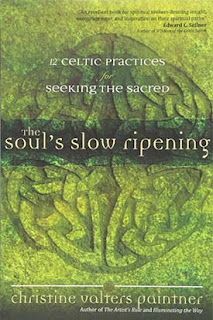Review of The Soul’s Slow Ripening: 12 Celtic Practices for Seeking the Sacred, by Christine Valters Paintner
Reviewed by Kerry Greenhill
June 8, 2022
I have not yet been to Ireland, but I have long been enchanted by the imagery of lush green landscapes, and I am drawn to the theological themes and poetry of Celtic Christian prayers and practices. So I came to Christine Valters Paintner’s book, The Soul’s Slow Ripening: 12 Celtic Practices for Seeking the Sacred, with an expectation of delight, spiritual resonance, and familiarity. I found all three, but I was also pleasantly surprised by the uniqueness of some of the Celtic practices she describes.
The practices included here are Thresholds, Dreaming, Peregrinatio and Seeking Your Place of Resurrection, Blessing Each Moment, Soul Friendship, Encircling, Walking the Rounds, Learning by Heart, Solitude and Silence, Seasonal Cycles, Landscape as Theophany, and Three Essential Things. Some of these I have learned about, studied, and practiced, in spiritual formation classes or out of personal interest. Others, such as Walking the Rounds, were quite new to me, and fascinating.
I found myself in a hurry to try to take it all in, to learn about everything as quickly as possible. But this is a book to savor, to read slowly and with intention, pausing frequently to reflect, to digest, to engage the practices suggested in each chapter. Paintner has written an introduction to these specific Celtic Christian practices that has the contemplative spirit of invitation and gentle attentiveness one might experience in spiritual direction, or on a retreat. She provides intellectual and historical background, personal experience and anecdotes, and guidance in how to engage the practices in creative and embodied ways.
Paintner also engages each practice through the lens of discernment, “a way of listening to our lives and the world around us and responding to the invitations that call us into deeper alignment with our soul’s deep desires and the desires God has for us” (p. xvii). As someone who seems to be always in discernment about whether I am “on the right path,” or living in the center of God’s desires for my life, I think I will be rereading these chapters over time, to let the poetry and deep spiritual insight wash over me again when I need to be reminded of the grace and beauty of the journey.
I especially recommend The Soul’s Slow Ripening for lovers of Celtic Christianity, practitioners of Christian spiritual formation, contemplatives, people seeking to discern some question or choice in life, and fans of Irish history and culture, but would not hesitate to lend this out to someone with no experience in any of these subjects, who was merely curious or intrigued by the title or cover. Well worth the time to read.
You can find an excerpt from the book here: https://mikemorrell.org/2022/01/the-souls-slow-ripening-christine-valters-paintner/
And the book can be purchased here: https://www.amazon.com/Souls-Slow-Ripening-Practices-Seeking/dp/1932057102/
Disclosure of Material Connection: I received this book free from the author and/or publisher through the Speakeasy blogging book review network. I was not required to write a positive review. The opinions I have expressed are my own. I am disclosing this in accordance with the Federal Trade Commission’s 16 CFR, Part 255.
